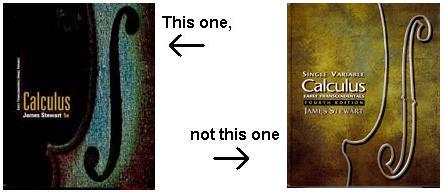MATH 111C : Calculus I
TEXT : James Stewart, Calculus: Early Transcendentals Single
Variable, 5th ed. (black and green cover), Thomson Brooks/Cole,
2003.

INSTRUCTOR : David Lantz
- Office : McGregory 316 --- Extension : 7737
- Official Hours : MWF 10:20-11:10, TR 2:00-3:00
- Effective Hours: Weekdays, 9:00-5:00, except when I am teaching, at lunch
(12:30-1:30 daily) or in a meeting.
- Home Phone : 824-0965 (Please do not call after 10 p.m.)
HOMEWORK : Assigned and collected daily -- see the list at
http://math.colgate.edu/math111/dlantz/calc1hw.html
Late homework will not be accepted. If all homework is turned in and accepted,
it is worth 24 extra credit points (about half a letter grade -- see below).
Extra credit is prorated from half the assignments: If you turn in only half
the assignments you will get 0 points; 3/4 are worth 12 points; all, 24; and
steps between.
TESTS : The three hour exams, worth 100 points each, will be 7:30-9:30 p.m. on
Tuesday evenings, September 28, October 19 and November 16, in McGregory 204.
There will be no "makeups" for any of these exams --
if you cannot come at the appointed time, please see me in time to schedule an
alternate time to take the exam early. The final (Mon Dec 13, noon) will
be comprehensive,
emphasizing the material covered after the last hour exam, and will also be
worth 100 points.
GRADING : The sum of four exam grades and homework points will be divided by 4
and the result will be put on a 90-80-70-60 scale. An added + or - will be
subjective.
WEB SOURCES: This page has URL
http://math.colgate.edu/math111/dlantz
A list of all the overhead transparencies used in class is available at
http://math.colgate.edu/math111/dlantz/suppindx.html
The solutions to the homework exercises (and the practice exams and exams,
eventually) are in .pdf format, so you will need a reader for
this format on your browser. One free source for such a reader
is from Adobe Acrobat:
http://www.adobe.com/prodindex/acrobat/readstep.html
You should also be aware that there are many free resources for calculus
on the Web. One, of which Prof. Aaron Robertson was a co-author, is
"Calculus on the Web" (or "COW") on the Temple University website:
http://www.math.temple.edu/~cow/
A long list of links to more sources is
http://archives.math.utk.edu/topics/calculus.html
SUGGESTIONS :
- If you see an error at the board, or if you do not understand something,
stop me and ask (even if everyone else seems to understand).
- Many Colgate students have seen some calculus in high school. If you have
studied calculus before, please consider transferring to Calculus II or
III; and if you remain in Calculus I, avoid the temptation not to study -- many
students have fallen victim to boredom and overconfidence while going through
a course a second time. Moreover, though your earlier course probably
emphasized functions presented as algebraic expressions, most functions
encountered in the real world are presented as graphs or as lists of data.
I will try to include as many of such approaches to calculus as time allows.
So I will have no patience with objections of the form, "We never did this
in high school!" If you are seeing the material for the first time, do not be
frustrated by the quick responses of those who have seen it before; studying
the text, lectures and homework will enable you to succeed.
- Doing the homework, regularly and thoughtfully, will contribute greatly to
your success in the course.
- It is a common practice, and a great mistake in mathematics courses, to
spend a week working only on, say, English (especially when a paper is due),
history the next, calculus the next, etc. Mathematics courses rely on all that
has come before; the next lecture may be incomprehensible if you do not
understand the last one.

